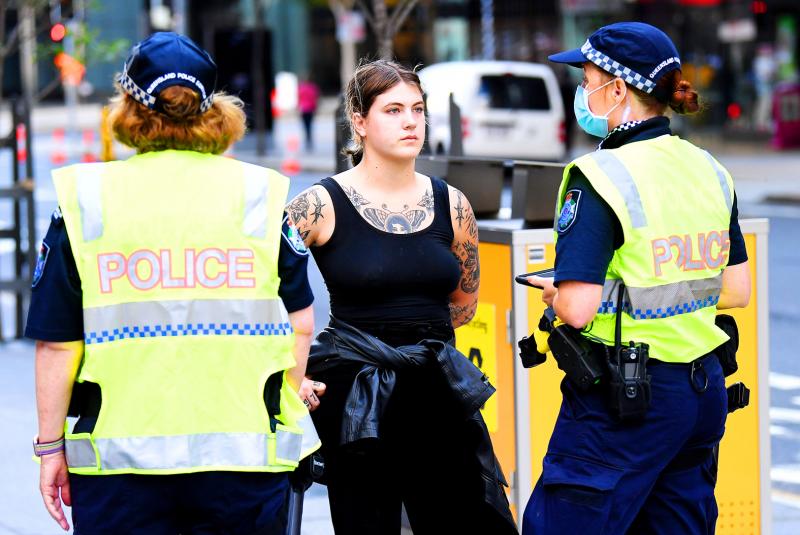Queensland yesterday extended a COVID-19 lockdown in Brisbane, while soldiers began patrolling Sydney to enforce stay-at-home rules as the nation struggles to stop the highly contagious Delta variant of SARS-CoV-2 spreading.
The Australian state said it had detected 13 new locally acquired COVID-19 cases in the past 24 hours — the biggest one-day rise the state has recorded in a year. The lockdown of Brisbane, Australia’s third-biggest city, was due to end today, but would now stay in place until late on Sunday.
“It’s starting to become clear that the initial lockdown will be insufficient for the outbreak,” Queensland Deputy Premier Steven Miles told reporters in Brisbane.

Photo: EPA-EFE
Australian Minister for Defence Peter Dutton yesterday said he would miss two weeks of parliament after he was told he must quarantine at home for 14 days as his two sons attend a school linked to the outbreak.
The rising new case numbers in two of the nation’s biggest cities come as disquiet grows on how the government of Australian Prime Minister Scott Morrison is handling the pandemic.
Although Australia’s vaccination drive has lagged behind many other developed economies, it has so far fared much better in keeping its COVID-19 numbers relatively low, with just under 34,400 cases.
Australia is going through a cycle of stop-start lockdowns in several cities after the emergence of the fast-moving Delta strain, and such restrictions are likely to persist until the country reaches a much higher level of vaccination coverage.
Morrison has promised that lockdowns would be “less likely” once the country inoculates 70 percent of its population older than 16, a target he expects to hit by the end of the year.
The lockdown of Brisbane and several surrounding areas comes as Sydney, the nation’s largest city, begins its sixth week under stay-at-home orders.
New South Wales, home to Sydney, yesterday said it detected 207 COVID-19 infections in the past 24 hours as daily new cases continue to linger near a 16-month high recorded late last week.
The state has recorded more than 3,500 infections since the outbreak began in June, and has asked for military personnel to aid efforts to enforce the restrictions.
About 300 army personnel, who are unarmed and under police command, yesterday began door-to-door visits to ensure people who have tested positive are isolating at their homes. They also accompanied police officers patrolling the areas of Sydney where most COVID-19 cases have been recorded.
Footage published online showed police asking the few people encountered as to why they were out of their homes in the largely deserted streets in Sydney’s south west.
Brigadier Mick Garraway, who is leading the military deployment, sought to downplay the army’s presence on the streets of Sydney.
“I want to say right up front that we are not a law enforcement agency and that is not what we will be doing,” Garraway told reporters in Sydney.
The military would help in delivering food and setting up vaccination stations, he said.

POLITICAL PRISONERS VS DEPORTEES: Venezuela’s prosecutor’s office slammed the call by El Salvador’s leader, accusing him of crimes against humanity Salvadoran President Nayib Bukele on Sunday proposed carrying out a prisoner swap with Venezuela, suggesting he would exchange Venezuelan deportees from the US his government has kept imprisoned for what he called “political prisoners” in Venezuela. In a post on X, directed at Venezuelan President Nicolas Maduro, Bukele listed off a number of family members of high-level opposition figures in Venezuela, journalists and activists detained during the South American government’s electoral crackdown last year. “The only reason they are imprisoned is for having opposed you and your electoral fraud,” he wrote to Maduro. “However, I want to propose a humanitarian agreement that

Young women standing idly around a park in Tokyo’s west suggest that a giant statue of Godzilla is not the only attraction for a record number of foreign tourists. Their faces lit by the cold glow of their phones, the women lining Okubo Park are evidence that sex tourism has developed as a dark flipside to the bustling Kabukicho nightlife district. Increasing numbers of foreign men are flocking to the area after seeing videos on social media. One of the women said that the area near Kabukicho, where Godzilla rumbles and belches smoke atop a cinema, has become a “real

‘POINT OF NO RETURN’: The Caribbean nation needs increased international funding and support for a multinational force to help police tackle expanding gang violence The top UN official in Haiti on Monday sounded an alarm to the UN Security Council that escalating gang violence is liable to lead the Caribbean nation to “a point of no return.” Special Representative of the UN Secretary-General for Haiti Maria Isabel Salvador said that “Haiti could face total chaos” without increased funding and support for the operation of the Kenya-led multinational force helping Haiti’s police to tackle the gangs’ expanding violence into areas beyond the capital, Port-Au-Prince. Most recently, gangs seized the city of Mirebalais in central Haiti, and during the attack more than 500 prisoners were freed, she said.

DEMONSTRATIONS: A protester said although she would normally sit back and wait for the next election, she cannot do it this time, adding that ‘we’ve lost too much already’ Thousands of protesters rallied on Saturday in New York, Washington and other cities across the US for a second major round of demonstrations against US President Donald Trump and his hard-line policies. In New York, people gathered outside the city’s main library carrying signs targeting the US president with slogans such as: “No Kings in America” and “Resist Tyranny.” Many took aim at Trump’s deportations of undocumented migrants, chanting: “No ICE [Immigration and Customs Enforcement], no fear, immigrants are welcome here.” In Washington, protesters voiced concern that Trump was threatening long-respected constitutional norms, including the right to due process. The